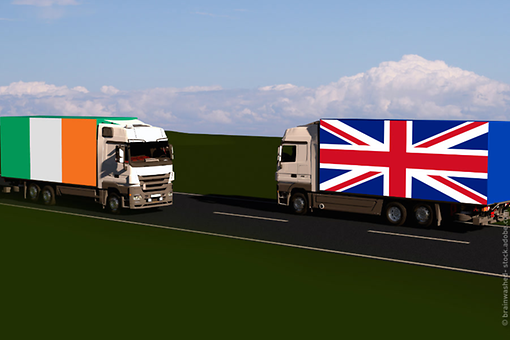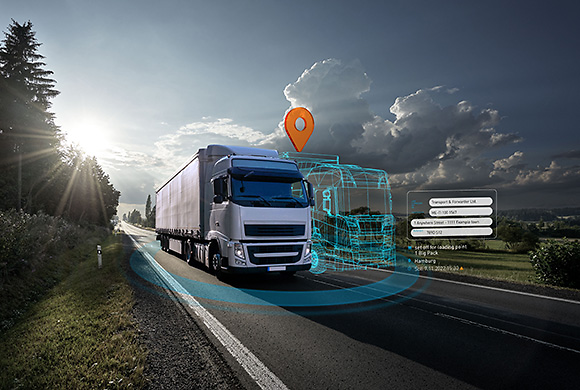How to ship Road Freight from the UK to Ireland efficiently

The UK exports to many European countries with the top five being France, Belgium, Ireland, Netherlands, and Germany. UK-registered vehicles also import most commodities from Belgium, France, Netherlands, Germany, and Italy. As Ireland is closer geographically and is subject to fewer regulations, it makes it easier for UK producers, manufacturers, and traders to move shipments to the EU via Ireland. Not only that, but the market size of the freight road transport industry in Ireland has grown 3.5% per year on average since 2019, leading to more opportunities for growth for UK businesses.
Since Brexit, transporting from the UK to Ireland has become more challenging. If you are a producer, manufacturer or trader wanting to ship goods from the UK to Ireland, you need to ensure you have a reliable transport partner and that your documentation is correct to avoid delays and added costs.
With TIMOCOM, the process is made smoother by providing you with vetted transport partners in the UK, Ireland and mainland Europe. In addition to that, our Road Freight Marketplace provides you with route planning, real-time tracking, and a host of other services. We are inviting you for a free trial of TIMOCOM to find out how it can help improve your business’s profitability.
How do you move goods between the UK and Ireland?
There is a lot of flexibility for moving goods from the UK to Ireland and it takes less time than shipping to the EU. Popular routes include:
Holyhead to Dublin
This transit takes 2 to 3 hours, but it is one of the busiest and most popular routes for freight. That means it has daily ferry services.
Liverpool to Dublin
Liverpool is one of the top 5 busiest ports in the UK and it takes about 8 hours and is generally for larger freight volumes.
Fishguard to Rosslare
This route takes around 3 hours from Wales to Ireland.
Portsmouth to Cork
This is a less frequent route but is suitable for shipments going to southern Ireland. It takes around 12 hours.
What documents do I need to move goods from UK to Ireland?
The usual documents for exporting to the EU are needed. For example, since 31 January 2025 a new digital checkpoint took place. You can submit an ENS via the Import Control System (ICS). However, while the UK requires an ENS for imports from the EU, Ireland does not impose the same requirement for imports from the UK. Ireland does require a Pre-Boarding Notification (PBN) for goods arriving via roll-on/roll-off (RoRo) ferry services, which must be submitted in advance of departure from the UK. If navigating these post-Brexit customs demands is stretching your capacity, we recommend you to join our logistics network and outsource these processes to a business partner. You can start testing our Road Freight Marketplace for free.
Below you find further information on the documents you would need when transporting goods to Ireland.
Customs declarations
Customs duties are needed which depend on the nature of the goods, their HS code, and the trade agreement in place. In this case, it is the EU-UK Trade and Cooperation Agreement (TCA). This allows a zero-tariff trade on lots of goods as long as they meet the rules of origin.
Both UK and Ireland require an Economic Operators Registration and Identification number (EORI) which can be applied for through gov.uk. In addition to the above information, TIMOCOM has written in the past articles about customs clearance as well.
Export license
You may need an export license if you are exporting controlled or restricted items out of the UK.
Proof of Origin
Under the TCA, you can qualify for tariff-free movement. A Proof of Origin certificate or Statement of Origin will prove your goods qualify for this. The certificate proves that the goods originate in the UK or the EU.
Challenges of moving goods from UK to Ireland
While moving goods from the UK to Ireland can be a quick way of getting goods into the EU, it does have its challenges.
Customs
As the UK is no longer part of the EU, customs declarations are required. As previously stated, you will need an export customs declaration when goods leave the UK.
You will also need an import customs declaration when the goods arrive in Ireland. Customs declarations should be made before arrival at the port of departure in the UK which requires planning. If you don’t have the correct documentation, this could cause delays or fines.
Increased costs
Since Brexit, there has been an increase in transportation costs which needs to be calculated to be profitable. The currency exchange needs to be taken into account when budgeting and the fluctuating exchange rates will impact the cost of shipping.
Congestion
The regulation changes mean lengthier border checks. Along with this, the Ro-Ro traffic increased by 6% in 2023 to the UK which has put the ports under more pressure. The issue of lack of haulage (a shortage in HGV drivers) has caused a problem in the UK leading to some freight not being collected as quickly as it normally would. Peak times such as before Christmas will create an increase in demand which can also cause delays.
Times
Advanced booking is required as peak times, holidays, and seasonal demand can create backlogs. Driver rest requirements also need to be considered whilst planning to move goods from the UK to Ireland. This can complicate ferry scheduling and route planning.
Supply chain disruptions
The added paperwork needed now to move goods from the UK to the EU can disrupt the supply chain. This especially impacts businesses relying on just-in-time delivery. Customers expect goods quickly and businesses need to deliver them, or competitors could steal their business.
Shipping restrictions
Ireland has specific restrictions on what can be imported. The goods must meet the rules of origin requirements that prove goods were fully produced or sufficiently processed in the UK or EU. This can be a complicated process, specifically for goods that have parts from multiple countries. The UK and Ireland can have different regulations for products in terms of health and safety, packaging and labelling. Some UK goods may need additional certification to be sold in Ireland.
Sanitary and Phytosanitary (SPS)
The SPS ensures food is safe to eat and applies to food and agricultural products being transported. The checks on this can cause delays if the documentation is not correct or it does not comply with EU standards.
What are the benefits of moving goods between the UK to Ireland?
Despite these challenges, there are many opportunities and benefits from moving goods from the UK to Ireland.
Time savings
UK and Ireland are geographically closer than the rest of the EU which means goods can be transported to Ireland in around two hours. Shipping goods to Ireland acts as a gateway to the rest of the EU which can increase market share.
VAT
Businesses can avoid paying VAT upfront by accounting for VAT on their VAT returns. Ireland allows businesses to use the Postponed VAT Accounting (PVA) for imports which can help with cash flow.
Fewer regulations
There can be fewer restrictions when moving goods from the UK to Ireland compared with other non-EU countries. The EU-UK Trade and Cooperation Agreement also means tariff-free trade on many goods. Once goods have entered Ireland, they can move to other parts of the EU without being subject to further customs checks. This not only speeds up processes but avoids more tariffs.
Cost savings
Along with fewer tariffs, Ireland has one of the lowest corporate tax rates in Europe which makes it a good base for trading within the EU.
How TIMOCOM can help you ship from UK to Ireland
TIMOCOM has many services to help your business become more efficient and profitable including our freight exchange, warehousing, and debt collection.
Build relationships with vetted carriers
There are over 55,000 vetted partners to work with on TIMOCOM’s freight exchange. And our tools offer automisation and TIMOCOM AI including getting a quote request for your freight. You can request potential business partners submit a suggested price for transport which saves you time and gives you a range of options.
You can also use our AI-supported freight entry. Simply click ‘Generate’ in the freight offer form and a dialogue box appears to copy and paste or drag and drop freight information or upload it as a file. You can copy text from an email or take a screenshot and the AI reads the data to generate a freight offer based on that information. This can be done in less than 20 seconds.
Learn more in this video how TIMOCOM AI can support your business:
Closed freight exchange
In the freight exchange, you can publish your freight and vehicle offers to partners created by you in a closed freight exchange. This means your offer is only seen by a select group but it can be posted on publicly on the TIMOCOM freight exchange after a certain timeframe. This way of publishing your offers means you choose what partners you want to work with to help you build long-term relationships.
We advise you to start testing our Road Freight Marketplace for free and find vetted business partners. You would only need to fill in your business details.
Route planning
With congestion causing delays, you want to ensure you take the most efficient route that reduces costs and gets your goods to their destination quickly. With TIMOCOM’s route planner, you can view the entire route including truck restrictions, roadworks, and tolls. This allows you to calculate any extra costs.
Find capacity to reduce empty loads
Empty loads are a missed opportunity for your business. With TIMOCOM’s Road Freight Marketplace, you can easily find freight to reduce empty loads. With up to 1 million international loads and vehicles available daily, you can be more sustainable and optimise your costs.
Irish company Robinson Farm found it a challenge to get local hauliers who could transport goods to the correct destination.
Warehousing
To ensure you stay ahead of competitors, you may decide to use warehousing to quickly get your goods to your customers. TIMOCOM has over 9,000 warehousing and logistics spaces across 46 European countries.
Tram Trinh Thanh
TIMOCOM Marketing Northern Europe, Benelux and UK
